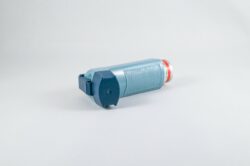EzriCare Eye Drops Linked to Bacterial Infections
In a recent lawsuit filed in Florida in February 2023, claims are being made about EzriCare Artificial Tears Lubricant Eye Drops being linked to multiple eye damaging issues. In the initial lawsuit filed, a woman claimed that use of the EzriCare eye drops caused her to develop a major bacterial infection.

While many other cases have come forward linking their eye and vision damage to the use of these eye drops, the most shocking outcome linked back to EzriCare eye drops is the death of an individual from using them.
Eye Damage Caused by EzriCare Eye Drops
A total of 55 cases have been reported of individuals contracting the drug-resistant Pseudomonas aeruginosa bacteria from the use of artificial tears. The CDC was quick to put out the following statement to the public after urging the discontinued use of the products:
- “Discontinue using EzriCare Artificial Tears pending additional guidance from CDC and FDA.
- If patients were advised to use EzriCare Artificial Tears by their healthcare provider, they should follow up with their healthcare provider for an alternative artificial tears product to use.
- Patients who used EzriCare Artificial Tears and who have signs or symptoms of an eye infection, such as discharge from the eye, eye pain or discomfort, redness of the eye or eyelid, feeling of something in the eye, increased sensitivity to light, or blurry vision, should seek timely medical care. At this time, CDC does not recommend testing of patients who have used this product and who are not experiencing any signs or symptoms of infection.”
Not only has the CDC warned to discontinue use of EzriCare eye drops, but the FDA has also provided warnings to stop use of the product as well.
Pseudomonas aeruginosa bacteria is one of the strongest antibiotic-resistant pathogens that can be contracted. On an ocular level, this bacteria is also one of the most common vision-threatening pathogens as well.
When Pseudomonas aeruginosa bacteria is within the eye, the pathogen, “secretes proteases that can cause liquefactive necrosis of the cornea, leading to rapid corneal weakening and perforation.”
This pathogen can affect any part of the body, but the telling signs that the bacteria has spread to the eyes includes symptoms like:
- Eye pain
- Redness of the eyes
- Swelling of the eyes
For patients who have suffered from contracting this bacteria from utilizing EzriCare eye drops, the have suffered the above symptoms along with:
- Hospitalization from infection
- Death from bloodstream infection
- Permanent vision loss from eye infections
Seeking Compensation for Damages Caused by EzriCare
Consumers who have purchased, used, and have developed eye or vision problems from EzriCare Artificial Tears Lubricant Eye Drops may be eligible for compensation by filing a lawsuit against Ezricare. Compensation may be sought for:
- Medical Expenses
- Lost Wages
- Negligence of EzriCare
- Death of a loved one
- And more
Legal Rights of Those Affected by EzriCare
If you have endured any of the above or have been inflicted with more extensive damage from the use of Ezricare products, you may be entitled to compensation. Retaining a law firm to assist with filing and following through with a lawsuit against Ezricare can be extremely beneficial to you and your case. Finding a law firm that has experience with mass tort actions, class action lawsuits, or other complex litigation can also be beneficial to the outcome of your case.




